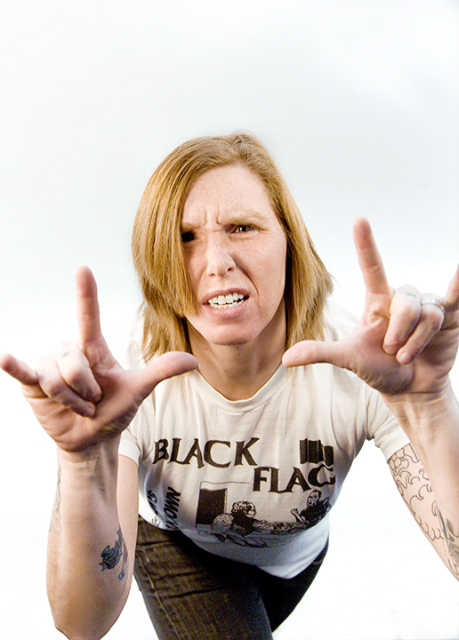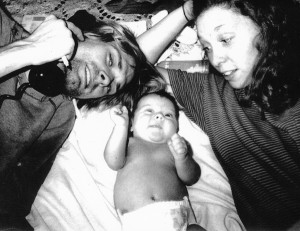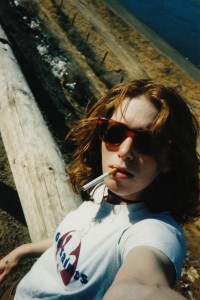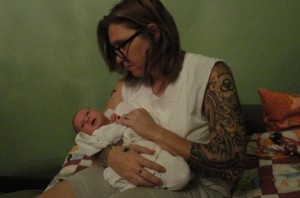I won’t say that I’m always particularly verbally eloquent but I was a little aghast at my rambling questions posed to Hole drummer and subject of QDoc Friday night film Hit So Hard Patty Schemel. I wasn’t necessarily nervous, but I can’t deny that Hole’s 1994 album Live Through This was second only to Team Dresch as the most played tape on my Freshman year walkman. And despite any verbosity on my part it was great to hear Schemel’s take on the documentary, and I’ve included the uncut audio below, in addition to the written interview. For a brush up on the film you can read the earlier post reviewing Hit So Hard.
[display_podcast]
qPDX: How was it coming out publicly as a musician in the 90s? Any contrast to being out personally?
Patty: I didn’t have any concerns about it. I was out with my peers and in my band. In my band it was a safe place to do that.
q: Any public backlash?
P: None that I knew about. It was a good experience. I got a lot of kids that would say thanks for coming out.
You grew up in a small town and you talk about some of your early band mates getting picked on and beat up. Did you ever experience that?
Just for being different? Yeah. I always hid my sexuality until I couldn’t stand it any longer and had to deal with it. Of course, I had a supportive mom and family. I mean, I’ve had things shouted…walking Seattle with my girlfriend.
Has being from a small town in the Northwest has influenced your work and life. Grunge was huge in the 90s and I remember Phranc [in the film] saying that they took their look from lesbians. I thought that was interesting.
Totally interesting. Did you mean that being from the NW made a difference?
Yeah.
When that style became popular it was about being different. If you’re gay that’s cool. If you’re straight that’s cool. It was a backlash against metal, top 40. In the underground where all the freaks are everybody’s cool. I think that’s what Kurt [Cobain] was saying a lot. It’s ok to be who you are.
Courtney [Love] talks a lot in the film about how close you two were close. What was your relationship with Kurt and were you really one of his only true friends?
She exaggerates a lot but I lived there and he was home all the time. We were friends but there’s no way I was his only confident. He liked his band members. The only thing that separated him from people was his drug addiction. It was the same for me in that situation.
How was it working with Courtney and being her friend?
It was difficult at times, but being in my band took me around the world. There was a difficulty around dealing with her fame. That whole thing was an entity unto itself. That was difficult. If it could’ve only been about the music…She complains a lot saying, “It should just be about the music,” but she does things to create chaos. She contradicts herself constantly. But I accept her and the way she is.
How was it coming back together for some of the initial screenings and reconnecting?
It’s been pretty good. We’ve never really disconnected. [The first screening this March in New York] was the first time we were all 4 together. It was good to see everyone and hear what they’re all doing. Courtney was, of course, late. Didn’t expect anything else, but she was kind and supportive.
How have friends and family felt about their portrayals in the film?
My mom hasn’t seen it yet but she will soon. Everybody that’s seen it so far has felt good. I’m not out to make anyone look bad. I’m just out to tell a story.
I’m going to backtrack a little bit. It seems like the time surrounding Kurt’s death was one of the first times you really started to grapple with your addictions. How did his death, along with Kirstin Pfaff’s contributed to your own relapse?
It was an overwhelming bit of reality and sadness and grief. This is what can happen to you but you never listen to these things even when it’s shown to you. I continued to stay on drugs off and on even after. I just didn’t die. I got close but I didn’t.
I appreciate that you had a lot of humor when talking about these things. At one point you’re talking about your look-alike in the Celebrity Skin video and it’s hilarious, but at the same time you’re talking about a difficult time in your life. Do you have any resentment about [being forced out of the band] and the effect it had on your drug relapse? How are you able to combine humor and pain?
In a way, that’s the way I deal with a lot of emotional stuff. Sort through it but also find some humor. When they were happening it was not funny in the least, but now I look back and see my part in everything. I just try to find the humor instead of living in the anger and resentment. I also laugh at myself.
Does that make it easier when seeing parts of the film? Courtney was pretty flippant in some ways.
How do I feel about her attitude?
Yeah.
She has her version of that time and I have what happened. I don’t have any problems with her versions of the way she talks. The only thing she tends to do is bring it around to be about her, but it’s really about me. She often makes things about her and she managed not to do that very much. Whatever.
How was the process of looking at the footage been from when you first started until now?
That was pretty intense at the beginning. I hadn’t seen it in a long time. We started when I asked [Director David Ebersole] to help me digitize the tapes, that’s when the story started to unfold. After we spoke about making it into a documentary was when we really started to look and makes notes. It was pretty tough to look at a lot of it. The process started 5 years ago and there were still a few things that I was a little edgy about. But the years went by and the interviews started and it began to take shape. I guess I just kind of grew into different things and reconnected with Eric [Erlandson] and Melissa [Auf der Maur] more and the edginess started to disappear.
The film is about that journey, telling it, and reconnecting. After seeing Eric’s interviews…I didn’t ever know how he felt about what happened in the studio. It was an eye opener to hear him talk about it.
It’s not about going, “Fuck you guys,” like I say in the movie. But I’m a million miles away from that. It’s about telling the story and my journey as an alcoholic and a drug addict, which started before I ever met them, and about me as a gay woman, and floating through this experience in my band and past that to where I am now.
When you opened that box 5 years ago was it the first time you’d seen the footage since you’d taken it? What was the impetus to take it in the first place?
I’d seen some of it. The goal was just have to something to hang on to. My young self was talking to my older self. I can’t believe my young self had a good idea at some point. I wanted to document it so I could look at it when I’m an old person…which I am now. It’s like a time machine. It’s amazing. I love it.
Of course you never record the really bad stuff. When things are really shitty I’m not busting out the camera.
You were pretty confident, even though you’d seen friends die, that’s you’d live to joke about being an old lady…Did that outlook help you survive? Did being gay ever make your addictions any more difficult?
They were totally unrelated. I knew I was gay before I ever had drugs or alcohol, and that I wanted to be in a band, and that I wanted to get married and have a baby. And I did it! Some of those things in the back of my mind kept me trying to live again and find a way out.
And you really have achieved your goals.
Totally. I didn’t become a millionaire but you become grateful for the small things. I have a home and roots and a daily schedule.
What’s next for you? Do you still play music out?
I play in a couple bands and work with Rock’n’roll camp for girls. I love to play drums and am still doing that. I’m not really sure what’s next. I just keep playing. But my goals are different. But it’s not just about making records or downloads…
…or whatever the kids are doing these days…
I almost said that…
If I were to be able to pay my electric bill from new music that’d be awesome too. I’m part of a band called Psychic friend with Will Schwartz from Imperial Teen. I’m just about to do some recording with my brother in our band Green Eyes.
How is it working at Rock Camp? The 2 girls in the film were quite eloquent and inspirational. Have you found that?
Yeah. We get back to focusing on the instrument and excitement. It reminds me of when I was like that.
I was a teenager in the 90s so I was excited to talk to you. Any of these youngsters excited to meet you?
They’ve heard of Nirvana but it’s their parents that are the ones that are excited. It doesn’t matter to me if they’ve never heard of [Hole].
Other projects? A dog daycare?
Daycare and boarding. Dog rescue. I’m as excited about my dog work as I am about my music…passionate.
Sounds like you’re still pretty busy. Have you had any time to be at home with your wife and new baby?
I can create a schedule to. We just went to the Silverlake Jubillee, an outdoor festival in my neighborhood. I’ve been in Psychic friend for 2 years but [my wife] Christina hadn’t had a chance to see me play because they’re always night shows. It didn’t really register to [our daughter] Beatrice, but she had her big headphones on and it was fun to have her there.
The activities [as a mom and spouse] are different. We’re in Seattle now and I can’t wait to go to the aquarium. I never did touristy things and now I want to do it all.
How is it being back in Seattle?
There’s so many meet-ups going on around the film. The guys [from my first band] the Milk Bones [are here]. They saw me at my best moment and worst moment and I’m excited to reunite with them.
Will you be in Portland for QDoc?
I won’t be in Portland for QDoc but David and Todd will be there.
I just want to say I love Portlandia.






[…] Patty Schemel, the lady that kept the beat for legendary lady rock band Hole is the subject of a film, Hit So Hard, opening this Friday at the Hollywood Theater (4122 NE Sandy Blvd). Below is a review written before it screened at the 2010 QDoc. You can read the original on qPDX, along with an interview with the openly gay drummer. […]